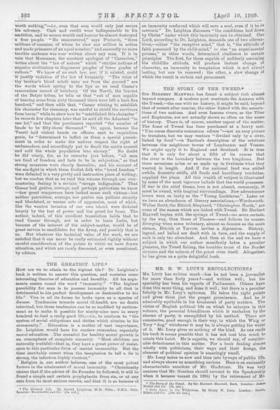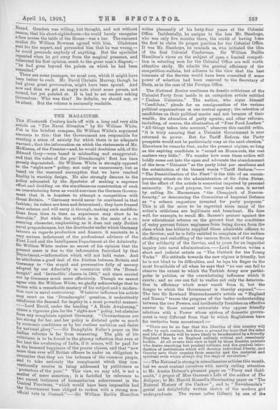MR. H. W. LUCY'S RECOLLECTIONS.f
Mn. Lucy ham written much—has be not been a journalist for more than forty years P—and written well ; but his speciality has been his reports of Parliament. Others have done this same thing, and done it well; but there is a peculiar felicity in Mr. Lucy's epitomes. He takes the right points and gives them just the proper prominence. And be ig admirably equitable in his treatment of party matters. The virtue of English political life on whieh he enlarges in this volume, the personal friendliness which is unshaken by the storms of party, is exemplified by his method. There are summaries, good enough in their way, in which the Whig or Tory dog," whichever it may be, is always getting the worst of it. Mr. Lucy gives us nothing of the kind. As one reads his book it seems possible that it has not cost him much to attain this habit. He is capable, we should say, of consider- able detachment in this matter. For a book dealing almost wholly with politicians, their ways and their doings, the element of political opinion is amazingly small.
Mr. Lucy takes us now and then into byways of public life, and always shows us something curious. Here ie an eminently characteristic anecdote of Mr. Gladstone. He was very anxious that Mr. Goschen should succeed to the Speakership when it became vacant (in 1881) by the retirement of Mr-
* The Story of the Tweed. By Sir Herbert Maxwell, Bart. London: James Nisbet and Co. [Os. net. J t Siretv Tears is the Wilderness. By Henry W. Lucy. London ; Smithi Elder, .aid Co. [Ws. ed. ilet.1 Brand. Goschen was willing, but thought, and not without reason, that his short-sightednese—he could barely recognise a face across the table of the House—was a bar. The eminent oculist Sir William Bowman agreed with him. Gladstone sent for the expert, and persuaded him that he was wrong,– h0 could persuade anybody of anything. But the specialist repented when he got away from the magical presence, and reiterated his first opinion, much to the great man's disgust,— " he had gone beyond the points on which he had been consulted."
There are some passages, we must own, which it might have *been better to omit. Mr. David Christie Murray, though he bed given great provocation, might have been spared. And flour and then we get an angry note about some person, not named, but yet pointed at. It is bad to set readers asking themselves : Who was this ? Be definite, we should say, or be silent. But the volume is eminently readable.







































 Previous page
Previous page